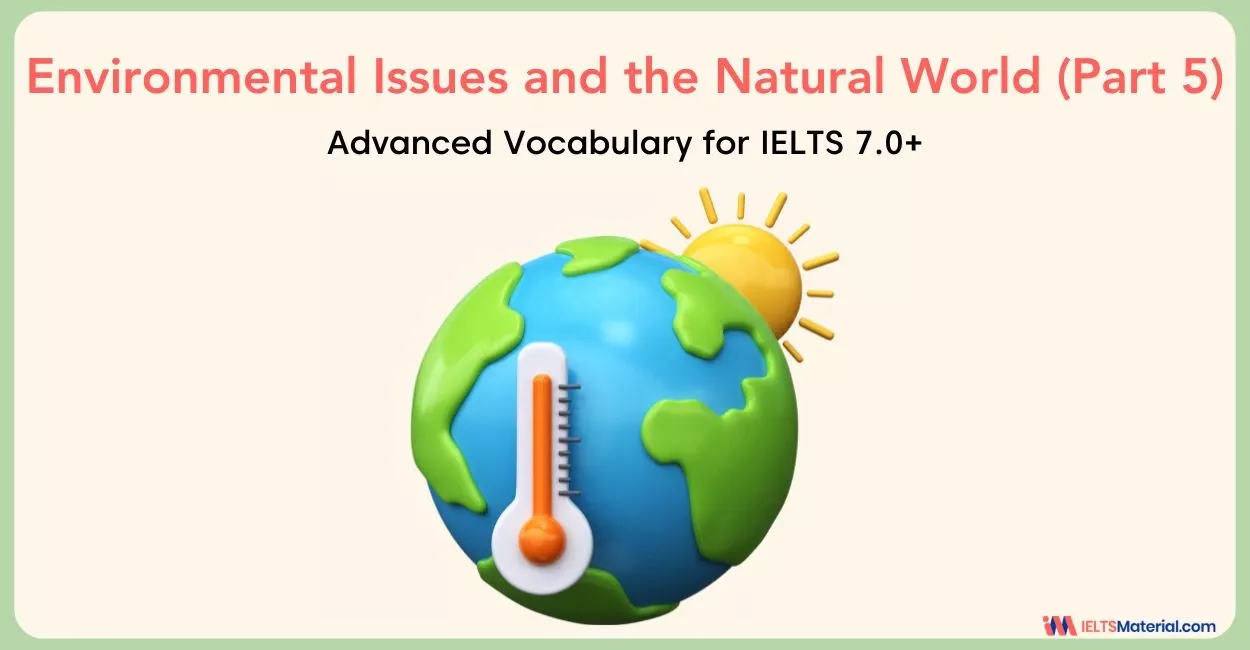Advanced Vocabulary for IELTS 7.0+: Environmental Issues and the Natural World (Part 5)
7 min read
Updated On
-
Copy link
Enhance your preparation with advanced IELTS vocabulary on environmental issues and the natural world. Get clear meanings, contextual examples, and focused practice exercises to strengthen your lexical resource for IELTS band score 7–8 success.
Table of Contents
- Environmental Challenges and Concepts (Nouns & Adjectives)
- Environmental Actions and Processes (Verbs)
- Exercises Based on Advanced Environmental Issues and the Natural World Vocabulary for IELTS 7.0 +
- Answer Key for Exercises Based on Advanced Environment Vocabulary for IELTS 7.0 +
- Additional Resources for Improving Your Environment Vocabulary for IELTS

Limited-Time Offer : Access a FREE 10-Day IELTS Study Plan!
Environmental issues and the natural world are among the most common themes in the IELTS exam. So, to achieve Band 7.0+ in Lexical Resource, it is not enough to know simple words like ‘pollution’ or ‘climate’. Instead, you need IELTS academic high-frequency vocabulary words and verbs that precisely express causes, effects, and solutions.
In this blog, we will explore essential vocabulary with strong environmental relevance to broaden your vocabulary for high-scoring answers.
Environmental Challenges and Concepts (Nouns & Adjectives)
This table focuses on an IELTS Vocabulary words list for Band 8 or 9 with advanced nouns and adjectives that describe environmental phenomena, problems, and conditions. These words often appear in academic IELTS Reading texts or Writing Task 2 essays.
|
Word |
Meaning |
Example Sentence |
|---|---|---|
|
Absorption |
the process by which substances are taken in or soaked up |
Forests play a key role in the absorption of carbon dioxide. |
|
Emission |
the release of gas, heat, light, or radiation |
Car emissions are a major contributor to urban air pollution. |
|
Conducive |
making a situation more likely or possible |
A stable climate is conducive to agricultural growth. |
|
Occurrence |
an incident or event, often something natural |
Flooding is a common occurrence in low-lying areas. |
|
Inhospitable |
harsh and difficult to live in |
Climate change may make certain regions inhospitable for humans. |
|
Concentrations |
the amount of a substance in a given space |
High concentrations of methane accelerate global warming. |
|
Deforestation |
the clearing of forests on a large scale |
Deforestation leads to loss of biodiversity and climate imbalance. |
|
Consumption |
the act of using resources, goods, or energy |
Overconsumption of fossil fuels has severe consequences. |
|
Depletion |
reduction in the amount of a resource |
The depletion of freshwater reserves threatens millions. |
|
Unrelated |
not connected |
The teacher said the issue was unrelated to climate change. |
|
Abundance |
a very large quantity of something |
The rainforest is known for its abundance of species. |
|
Dependence |
reliance on something |
Global dependence on fossil fuels hinders renewable growth. |
|
Emergence |
the process of coming into view or becoming important |
The emergence of green technology is promising for the future. |
|
Extraction |
the process of removing natural resources |
Oil extraction has devastated coastal ecosystems. |
|
Irreversible |
impossible to change back or undo |
Some damage caused by climate change may be irreversible. |
Book IELTS online classes to learn new environment vocabulary for the IELTS test!
Environmental Actions and Processes (Verbs)
This table includes verbs commonly used in academic contexts to describe environmental actions, effects, and changes. These are high-frequency words in IELTS Writing Task 2 essays and Reading passages.
|
Word |
Meaning |
Example Sentence |
|---|---|---|
|
Exacerbating |
making a problem worse |
Rising temperatures are exacerbating droughts in Africa. |
|
Reverse |
to change something back to its original state |
Governments are working to reverse the effects of deforestation. |
|
Intensification |
the process of becoming stronger or more extreme |
The intensification of storms is linked to global warming. |
|
Penetrating |
entering or passing through something |
UV rays are penetrating the weakened ozone layer. |
|
Reflected |
thrown back without being absorbed |
Some solar radiation is reflected back into space. |
|
Emitted |
released into the air |
Carbon dioxide is emitted during fuel combustion. |
|
Mitigate |
to reduce the severity of something |
Policies must mitigate the effects of climate change. |
|
Offset |
to counterbalance emissions |
Tree planting can offset carbon footprints. |
|
Degrade |
to damage or wear down the environment |
Plastic waste degrades soil and water quality. |
|
Overexploit |
to use resources excessively |
Overexploiting fisheries leads to species extinction. |
|
Restore |
to return to original condition |
Wetland restoration is vital for biodiversity. |
|
Adapt |
to adjust to new conditions |
Communities must adapt to rising sea levels. |
|
Regenerate |
to grow back or renew |
Forests can regenerate if protected from logging. |
|
Implement |
to put a plan or law into action |
Governments must implement strict environmental policies. |
Explore our Vocabulary for IELTS to amp up your vocabulary for IELTS!
Exercises Based on Advanced Environmental Issues and the Natural World Vocabulary for IELTS 7.0 +
It is impossible to improve your band score by learning the meaning of words and sentences only. Using it effectively requires vocabulary exercises that help your brain transfer words from short- to long-term memory.
So, given below are some exercises based on environmental issues and the natural world vocabulary for IELTS that will help you improve your word choice and boost your IELTS vocabulary.
(A) The Role of Humanity: Change the form of the word in square brackets suitably to fit each gap.
The greenhouse effect is essentially the process by which the 1. _______________ [absorb] and 2. _______________ [emit] of infrared radiation by gases in the atmosphere warms the planet’s lower atmosphere and surface. Put simply, the so-called greenhouse gases which cause this effect basically redirect heat that would otherwise escape back into outer space down towards the surface of the earth. This phenomenon is actually key to creating conditions 3. _______________ [conduct] to life on Earth. Without the natural 4. _______________ [occur] of these gases and consequent planetary warming, Earth would actually be a very 5. _______________ [hospitable] place. The problem, however, began in the 1800s during the industrial revolution. The increased amount of industrial activity led to additional volumes of greenhouse gases being produced unnaturally as a result of human activity. Obviously, as the level of industrial activity has increased dramatically over the last several centuries, so too then has the rate of production and emission of greenhouse gases. Human activity has therefore altered the balance of things with 6. _______________ [concentrate] of greenhouse gases such as C02 and methane in the atmosphere significantly higher today than at any other time in the past 800,000 years of Earth’s history. About two-thirds of the additional C02 released is attributed to the burning of fossil fuels, while the rest of the increase in atmospheric greenhouse gas levels is put down to changes in land-use, in particular 7. _______________ [forest], and population growth, which, for example, has led to greater numbers of livestock than ever before being reared for 8. _______________ [consume], and a consequent significant increase in methane emissions. The 9. _______________ [deplete] of the tropospheric ozone layer, caused by chlorofluorocarbons, has also had a significant warming effect on the Earth’s surface, but this is not to be confused with the greenhouse effect as the two phenomena are largely 10. _______________ [relate]. Given the relative 11. _______________ [abound] of fossil fuels, our 12. _______________ [depend] on them, and the 13. _______________ [emerge] of new and more efficient methods of 14. _______________ [extract], the likelihood of a significant reduction in carbon emission levels in the near future seems very unlikely. Therefore, the problem of global warming also appears very unlikely to moderate. Besides, many scientists believe the damage already done may be 15. _______________ [reverse].
(B) Nature’s Role: Use the words from the box to fill gaps 1-6. You may have to change the tense or form, and you should only use each word once.
| exacerbate emit penetrate reflect intensify reverse |
If anything, while humankind has been 1.___________ the warming situation, nature herself, by happy coincidence, has been behaving in such a way as to partially 2. ___________ the effects, and, over the last half a century or so, in particular, nature has had a significant cooling effect. For a start, there has been a significant 3. ___________ of volcanic activity, and the consequent release of particulates and soot contributed to what is termed Global Dimming, a cooling phenomenon whereby more of the Sun’s rays are prevented from 4. ___________ the atmosphere and reaching the planet’s surface, and are instead 5. ___________ back out into space. Another cooling factor is that of solar output. If anything, less solar radiation has been 6. ___________ by the Sun in the past thirty years or so.
Answer Key for Exercises Based on Advanced Environment Vocabulary for IELTS 7.0 +
(A)
1 absorption 2. emission 3. conducive 4. occurrence 5. inhospitable
6 concentrations 7. deforestation 8. consumption 9. depletion 10. unrelated
11 abundance 12. dependence 13. emergence 14. extraction 15. irreversible
(B)
1 exacerbating 2. reverse 3. intensification
4 penetrating 5. reflected 6. emitted
Join a FREE online webinar to learn how to boost your IELTS vocabulary for success!
Additional Resources for Improving Your Environment Vocabulary for IELTS
Here are some additional links to help you learn more environment vocabulary for IELTS:
- Advanced Vocabulary for IELTS 7.0 +: ENVIRONMENTAL ISSUES AND THE NATURAL WORLD (Part 1)
- Advanced Vocabulary for IELTS 7.0 +: ENVIRONMENTAL ISSUES AND THE NATURAL WORLD (Part 2)
- Advanced Vocabulary for IELTS 7.0+:Environmental Issues and The Natural World(Part 3)
- Advanced Environment Vocabulary for IELTS 7.0 +: Environmental Issues and the Natural World (Part 4)
- Advanced Vocabulary for IELTS 7.0 +: Environmental Issues And The Natural World (Part 6)
- Advanced Vocabulary for IELTS 7.0 +: ENVIRONMENTAL ISSUES AND THE NATURAL WORLD (Part 7)
- Advanced Vocabulary for IELTS 7.0 +: Environmental Issues And The Natural World (Part 8)
To conclude, environmental issues and the natural world terms frequently appear in scientific reports, news articles, and academic extracts in the listening and reading of the IELTS exam. Using precise words and collocations makes your arguments more natural and fluent in writing and speaking tasks. Therefore, by mastering these Band 7.0+ words and verbs, you will significantly improve your ability to discuss environmental issues and the natural world in IELTS.
Useful Links:
- Useful Phrases & Expressions About Environment: Advanced Vocabulary for IELTS Speaking
- How to Improve Your Vocabulary Score in IELTS Writing and Speaking?
- The More You Read, The Better You Write : Band 8+ Tip for IELTS Writing
- Check Your English Vocabulary for IELTS Exam Free PDF
- Useful Resources & Websites for IELTS Vocabulary

Start Preparing for IELTS: Get Your 10-Day Study Plan Today!
Improve your Vocabulary from our Vocabulary Topics



Recent Articles

Nitika Gupt

Nehasri Ravishenbagam

Nehasri Ravishenbagam






Post your Comments